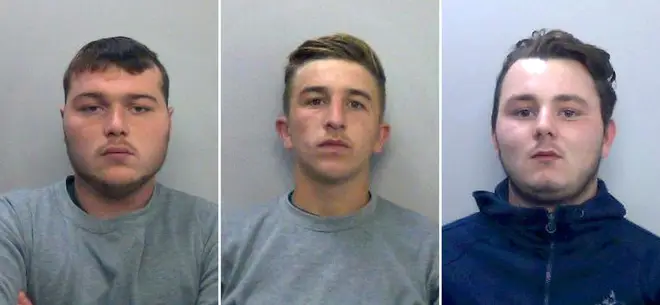
Oli Dugmore 4am - 7am
6 August 2020, 18:12

Legal expert breaks down the sentencing of PC Harper's killers
A legal expert explained the full details around the sentencing of the killers of PC Andrew Harper, and revealed he believes they received sentences at the "top end" of the range.
Barrister Donal Lawler, from187 chambers in Fleet Street, explained to LBC the details around the sentencing of the killers of PC Andrew Harper.
The conversation comes on the day the mother of PC Harper launched a campaign for a "mandatory" 20-year minimum prison term for killers of police officers - calling it "Andrew's Law".
PC Harper was killed as he tried to stop three thieves fleeing after they stole a quad bike in Stanford Dingley, Berkshire, on August 15 last year.
Henry Long, 19, and 18-year-olds Jessie Cole and Albert Bowers were sentenced for the 28-year-old newlywed's manslaughter.
The experienced legal professional told LBC the killers of PC Harper are considered adults. They're 18. "And they were treated as adults."
But he said there were "two very big distinctions her," he added "murder is where a jury finds that an individual intended to kill or cause really serious harm."
But the offence the trio were found guilty of was manslaughter which "is where the person has been killed as the result of an unlawful act."
He said the jury's verdict in this case, meant that they could not be sure that the offenders knew PC Harper had been caught up in the tow rope.
"So that's why it's a fundamentally different sentence," he said.
When Ian Payne asked how the judge might have come to his sentencing decision and if age was a factor, the barrister said age would have been a consideration.

He explained had the three been convicted of murder, and had they been over 21 it would have been a "whole life" sentence meaning "you're never released."
However, if you're over 18 and under 21 it would be 30 years.
But in this case, the judge found it was the "top end" of the manslaughter range of the sentencing guidelines.
"The judge has what's called sentencing guidelines, which all judges use to assist them and ensure that consistency. And what he said for these defendants is it's the highest culpability there is it's category one," Donnal told LBC.

Pc Andrew Harper paid ultimate price for teenagers' criminality
He added, "a category one sentence would have a starting point of 18 and a range up to 24 years."
He explained that for the driver Henry Long the starting point was 24 years. But, he then gave him credit for his guilty plea, which took him down to 16 years.
But he said "that's not the end of the story. Because the judge also found something else which is very significant. He found that Mr Long was dangerous in legal terms. And that means that there was a significant risk that he would commit further specified offences in the future," the barrister told LBC.
This means the judge found that "those offences would cause serious physical or psychological harm to other people. So a dangerous offender."

Pc Harper death: Three teenagers convicted of manslaughter
The legal expert said this is where the age is important, because what the judge said, If Long had been older, in those circumstances, he would have imposed a life sentence, but because of his age, he was just able to give what's called an extended sentence.
"So of that 16-year sentence, Mr. Long is eligible but not entitled for release after 11 years, but the parole board will decide whether he will be released and only released after 16 years," he told LBC's Ian Payne.
Ian asked what was the process for the family if they want to to appeal against the sentences being too lenient? Is there one?
Mr Lawler said that "an individual can make a complaint or a submission to the attorney general's office, who will then consider all the facts of the case and decide whether the sentence is too lenient".
Giving his view on the case, he said "the judge has looked at the sentencing guidelines. He has taken the top end of the range 24 years and has in his judgement because of course he was he was able to see the trials and see the individuals, he was able to use his discretion to not pass a life sentence."
The legal expert said, in his view, he thought it would be "difficult to see that was unduly lenient".
The barrister gave a fascinating insight into how offences against certain people and certain professions are treated differently in law.
Watch the whole fascinating and informative call in the video at the top of the page.